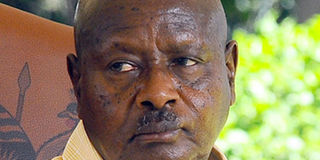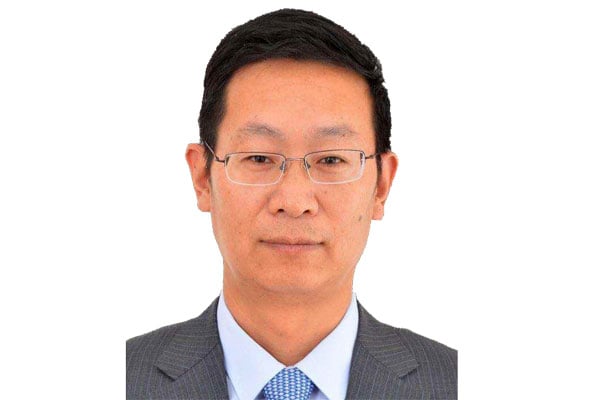Prime
Why democracy and development failed in Uganda

President Museveni at a function. FILE PHOTO
What you need to know:
Widespread fear. Most of Ugandan society lacks confidence. Most of the President’s Cabinet ministers cannot look him directly in the eye. Most of the public trembles in the presence of army generals.
What does one do when a week comes by and one has nothing to write about?
That is what I feel this week and, increasingly, these days.
We have said practically all there is to say about Ugandan elections, politics, governance, corruption, political party infighting, nepotism, westerners taking most top jobs, incompetence in the civil service and the government and the lack of everything in Uganda (drugs in hospitals, clean drinking water and sanitation, jobs and street lights).
The quality of newspaper, magazine, book, TV and radio coverage of Uganda’s 50th independence anniversary in the months leading up to October 9, 1012, suggested that intellectual life in Uganda in 50 years has not yet attained fruition.
The society has not yet attained depth in research, archived material and investigative skills. This takes me to something I’ve been thinking about over the last several months: the Megapixels in digital photography. These are the millions of dots that, like with a television or computer screen, come together to form the image that we see.
Complicated technical details and other considerations aside, in general the higher the number of megapixels a digital camera has, the better the quality of images it takes. In the world of photography, 12 Megapixels (12MP) is now considered the minimum for professional-looking photographs.
Uganda and the low megapixel countries
The question of megapixels in digital photography has given me a metaphor of the limitations in Ugandan and most African societies.
When Uganda attained independence in 1962, it had a low intellectual base and 50 years later, there has been a slight improvement but that’s about it.
Even with several general elections held, parliaments elected, secondary schools and universities pumping out people with academic qualifications, there is still something lacking in Uganda.
That problem, as I see it, is that we are low on societal megapixels. For a society to be ranked as advanced, it needs a large megapixel count, so to speak.
It needs to have a large number of mainstream professionals like medical doctors, lawyers, teachers, journalists, accountants and engineers. These basic “marketable” professionals were few in number among Black Ugandans for the first 20 years of independence.
But even now with that number greatly increased, Uganda still suffers a low megapixel count. If Uganda were a camera, I would estimate it at about three megapixels, the most basic digital camera type.
Uganda, Tanzania, Kenya, Rwanda, Zambia and other such countries generally fall in this three megapixel economic and social category. Since the explosion of FM radio stations in Uganda in the mid 1990s and the growth of the advertising industry, marketing and sales executives and freelance radio and newspaper reporters and photographers have become more visible in society and generally higher paid than they were in the 1980s.
But they are still on a shaky footing and most freelancers, be they in marketing or journalism, report that it is an uphill struggle to make ends meet from month-to-month.
The four-megapixel to 10-megapixel countries
To move from a three-megapixel societal standard to a lower middle income country like Egypt or Tunisia, other professions must become middle class and fully-paying. These include photographers, graphic designers, furniture makers, sign painters, librarians, agriculture and veterinary extension workers, marketing and sales executives and any work that is done by freelancers.
In the Arab North Africa, book authors and professionals like poets, photographers and librarians are busy, respected people. They can earn a basically decent living from their skills. Apart from South Africa, North Africa and Muslim Sudan have the highest percentage of Internet use, book purchases and newspaper readership in Africa.
There are very few authors, if any, in Uganda who can earn a monthly wage and financial sustenance from the sales or licensing of their poems, books or photographs.
Ugandans who take photographs for weddings and some who take photographs for corporate billboards are the only type in this profession who earn a middle class income. Librarians are still viewed as largely irrelevant and obscure professionals.
The 12 to 16-megapixel countries
In this category are to be found Eastern Europe, the Arab Gulf states, parts of southern Europe and Latin America and South Africa. Literacy is relatively high, purchasing power also high, the kinds of professions that Ugandans view as embarrassing such as veterinary medicine, librarian sciences, botany, zoology, agriculture, forestry, poetry and others do fairly well.
One does not need to be a lawyer, doctor, MBA holder, company executive director, businessman, engineer or architect to do well financially. A veterinary doctor can earn a high income treating thoroughbred horses that take part in the Dubai or Abu Dhabi racing classic.
The 20-megapixel countries
These are the most intellectually-developed countries. The United States, Britain, Italy, Japan, South Korea, Canada, China, Russia, Australia, Switzerland, Germany, Taiwan, France, Sweden, Norway, Austria and that kind of country.
In such high-income, high megapixel, high-intellectual societies, anything is possible in life. Even the unemployed in most of these countries still earn what in Uganda would be regarded as a decent monthly wage.
Odd jobs, “kyeyo”, working in elderly people’s homes, being a nurse, vet, archaeologist, painter, philosopher, poet, soil scientist, graphic designer, website designer, space scientist, librarian, marine biology, teacher, everything called a profession is well-regarded and pays well, at least by world standards.
Every branch of human knowledge is fully developed, every possible career makes sense. A man who decides to set a new world record in air balloon flight can become as much a celebrity as a popular TV talk show host.
The true intellectual advancement of these 20-megapix societies can be seen in the high number of new book titles they publish each year, the number of newspaper, magazine titles in print and the huge number of websites that are in operation.
All this, of course, is just a rough sketch by which I am trying to illustrate the point that the concentration of human intellect and social weight is still very low in Uganda and it is this low intellectual base, this low megapixel count, that explains so much of what we see in Uganda and which puzzles us.
Most of Ugandan society lacks confidence. Most of the President’s Cabinet ministers cannot look him directly in the eye. Most of the public trembles in the presence of army generals.
Most Ugandans “fear” their LCIII chairperson. What a ‘Big Man’ says is obeyed with few questions asked. At President Yoweri Museveni’s press conference held at his Rwakitura country home, the UBC TV cameras often turned to the assembled journalists.
Most were junior reporters and editors and most were visibly overwhelmed just to be sitting within five metres of the Head of State.
When Members of Parliament meet the President, both opposition and the ruling NRM, most sit uneasily in their chairs and when they stand up to speak, even opposition MPs make it a point to stress that “I have nothing personal against you, Your Excellency”. Most Ugandan employees are terrified of the Managing Director or the General Manager.
The headmasters and headmistresses are semi-gods in their schools. Magistrates and High Court judges throughout Uganda’s 50-year independence history, even when they know full well that they belong to an independent and important third branch of government, have often buckled under pressure from State House, the President, powerful ministers and aggressive military commanders.
In these kinds of societies, everything is paid lip-service. The society lacks the clout, backbone, confidence and in-depth knowledge to stand up for their rights, to do what they do without fear of the authorities.
This is what, in short, makes Uganda and countries like it, three-megapixel societies. They are weak economically and politically, because they are first and foremost, weak in intellectual life.




